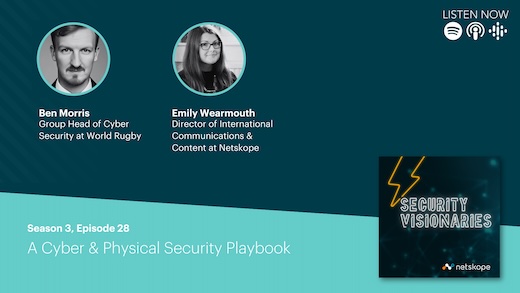Quantify the value of Netskope One SSE – Get the 2024 Forrester Total Economic Impact™ study
-
Pourquoi Netskope
- Pourquoi Netskope
Pourquoi Netskope
Changer la façon dont le réseau et la sécurité fonctionnent ensemble.
Recevoir le rapportUn leader sur SSE. Désormais leader en matière de SASE à fournisseur unique.Découvrez pourquoi Netskope a été classé parmi les leaders de l'édition 2024 du Gartner® Magic Quadrant™️ pour le Secure Access Service Edge à fournisseur unique.
- Pourquoi Netskope
Nos clients
Netskope sert plus de 3 400 clients dans le monde, dont plus de 30 entreprises du Fortune 100
Obtenir l'EBookCoup de projecteur sur les idées novatrices de nos clientsDécouvrez comment des clients innovants naviguent avec succès dans le paysage évolutif de la mise en réseau et de la sécurité d’aujourd’hui grâce à la plateforme Netskope One.
- Pourquoi Netskope
Nos partenaires
Nous collaborons avec des leaders de la sécurité pour vous aider à sécuriser votre transition vers le cloud.
En savoir plus sur les partenaires de NetskopeLa stratégie de commercialisation de Netskope privilégie ses partenaires, ce qui leur permet de maximiser leur croissance et leur rentabilité, tout en transformant la sécurité des entreprises.
-
Plateforme
- Plateforme
Plate-forme Netskope One
Netskope One est une plate-forme convergente de sécurité et de réseau en tant que service.
Obtenir le livre blancVotre réseau de demainPlanifiez votre chemin vers un réseau plus rapide, plus sûr et plus résilient, conçu pour les applications et les utilisateurs que vous prenez en charge.
- Plateforme
Partenaires technologiques et intégrations
Netskope s'associe aux sociétés les plus performantes en matière de technologies destinées aux entreprises.
En savoir plus sur Cloud ExchangeNetskope Cloud ExchangeLe Netskope Cloud Exchange (CE) fournit aux clients des outils d'intégration puissants pour optimiser les investissements dans l'ensemble de leur infrastructure de sécurité.
-
Produits
- Produits
Security Service Edge
Protégez-vous contre les menaces avancées et compatibles avec le cloud et protégez les données sur tous les vecteurs.
Présentation des produitsLa plateforme du futur est NetskopeSecurity Service Edge (SSE), Cloud Access Security Broker (CASB), Cloud Firewall, Next Generation Secure Web Gateway (SWG), et Private Access for ZTNA intégrés nativement dans une solution unique pour aider chaque entreprise dans son cheminement vers l'architecture Secure Access Service Edge (SASE).
- Security Service Edge (SSE)
- Next Gen Secure Web Gateway (SWG)
- Firewall (FWaaS)
- RBI (Isolation de navigateur à distance)
- Cloud Access Security Broker (CASB)
- Gestion du niveau de sécurité SaaS
- Private Access
- Prévention des pertes de données (DLP)
- Gestion de la sécurité des données (DSPM)
- Intelligence des dispositifs
- Protection contre les menaces
- Security Service Edge (SSE)
- Produits
SD-WAN
Fournissez en toute confiance un accès sécurisé et performant à chaque utilisateur, appareil, site et cloud distant.
En savoir plus Next Gen SASE BranchNext Gen SASE Branch est hybride - connectée, sécurisée et automatiséeNetskope Next Gen SASE Branch fait converger Context-Aware SASE Fabric, Zero-Trust Hybrid Security et SkopeAI-Powered Cloud Orchestrator dans une offre cloud unifiée, ouvrant la voie à une expérience de succursale entièrement modernisée pour l'entreprise sans frontières.
- Produits
Secure Access Service Edge
Netskope One SASE fournit une solution SASE cloud-native, entièrement convergée et à fournisseur unique.
Obtenir l'EBookL'architecture SASE pour les nulsObtenez votre exemplaire gratuit du seul guide consacré à la conception d'une architecture SASE dont vous aurez jamais besoin.
-
Solutions
- Solutions
Transformation du réseau
Gagnez en agilité et en efficacité grâce à la transformation numérique.
Aller à l'aperçu des solutionsDécouvrez NewEdgeOptez pour les meilleurs services de sécurité cloud du marché, avec un temps de latence minimum et une fiabilité élevée. - Solutions
Modernisation de la sécurité
Relevez les défis de sécurité d'aujourd'hui et de demain.
Découvrez comment nous sécurisons l'utilisation de l'IA générativePermettez en toute sécurité l'utilisation d'applications d'IA générative grâce au contrôle d'accès aux applications, à l'accompagnement des utilisateurs en temps réel et à une protection des données de premier ordre.- Protection avancée contre les menaces
- protection des données
- Travail hybride
- Risques internes
- Maintien de la conformité
- Remplacer les VPN
- Autorisez ChatGPT et l’IA générative en toute sécurité
- Applications cloud gérées sécurisées
- Sécuriser les applications cloud non gérées
- AWS, Azure et GCP
- Protection avancée contre les menaces
- Solutions
Cadres
Adoptez les cadres réglementaires qui façonnent la cybersécurité.
Aller à l'aperçu des solutionsEn savoir plus sur la confiance zéroSolutions Zero Trust pour les déploiements du SSE et du SASE - Solutions
Gouvernements et industries
Netskope aide les plus grandes agences et entreprises du monde à sécuriser leur passage à l'informatique dématérialisée.
En savoir plus sur Netskope GovCloudNetskope obtient l'autorisation FedRAMP High AuthorizationChoisissez Netskope GovCloud pour accélérer la transformation de votre agence.
- Services financiers et d'assurance
- Santé et sciences de la vie
- Haute technologie
- Établissements d'enseignement supérieur
- Enseignement primaire et secondaire
- Juridique
- Production industrielle
- US Public Sector
- UK Public Sector
- Gouvernement australien
- Commerce de détail et hébergement
- Sociétés de services
- Utilities
- Services financiers et d'assurance
-
Ressources
- Ressources
Ressources
Découvrez comment Netskope peut vous aider à sécuriser votre migration vers le Cloud.
Écouter le podcast Parcourir tous les podcastsPodcast Security VisionariesA Cyber & Physical Security Playbook
Emily Wearmouth et Ben Morris examinent les défis posés par la protection des manifestations sportives internationales, lorsque la cybersécurité rencontre la sécurité physique. - Ressources
Blog
Découvrez comment Netskope permet la transformation de la sécurité et de la mise en réseau grâce à l'accès sécurisé à la périphérie des services (SASE).
Lire le blogDerniers blogsDécouvrez comment Netskope peut faciliter le parcours Zero Trust et SASE grâce à des capacités d'accès sécurisé à la périphérie des services (SASE).
- Ressources
Événements et ateliers
Restez à l'affût des dernières tendances en matière de sécurité et créez des liens avec vos pairs.
Explorer les sessionsSASE Week 2024 A la demandeApprenez à naviguer dans les dernières avancées en matière de SASE et de confiance zéro et découvrez comment ces cadres s'adaptent pour répondre aux défis de la cybersécurité et de l'infrastructure.
- Ressources
Définition de la sécurité
Tout ce que vous devez savoir dans notre encyclopédie de la cybersécurité.
En savoir plus sur SASEQu'est-ce que SASE ?Découvrez la future convergence des outils réseau et sécurité dans le modèle économique actuel, dominé par le cloud.
- Aperçu de la définition de la sécurité
- Qu'est-ce que SASE ?
- Qu'est-ce que le Security Service Edge ?
- Qu'est-ce qu'un CASB ?
- Qu'est-ce que l'accès au réseau sans confiance (ZTNA) ?
- Qu'est-ce qu'une passerelle Web sécurisée (SWG) de nouvelle génération ?
- Qu'est-ce que la prévention des pertes de données (DLP) ?
- Qu'est-ce que le SD-WAN ?
- Qu'est-ce que l'IA générative ?
- ¿Qué es SSPM?
- Qu'est-ce que FedRamp ?
- Aperçu de la définition de la sécurité
-
Entreprise
- Entreprise
Entreprise
Nous vous aidons à conserver une longueur d'avance sur les défis posés par le cloud, les données et les réseaux en matière de sécurité.
En savoir plusSoutenir le développement durable par la sécurité des donnéesNetskope est fière de participer à Vision 2045 : une initiative visant à sensibiliser au rôle de l'industrie privée dans le développement durable.
- Entreprise
Carrières
Rejoignez les 3 000 membres de l'équipe de Netskope qui construisent la première plateforme de sécurité cloud-native du secteur.
Rejoignez l’équipeContribuez à façonner l'avenir de la sécurité du cloudAt Netskope, founders and leaders work shoulder-to-shoulder with their colleagues, even the most renowned experts check their egos at the door, and the best ideas win.
- Entreprise
Solutions pour les clients
Nous sommes là pour vous et avec vous à chaque étape, pour assurer votre succès avec Netskope.
Aller à Solutions clientsLes professionnels du service et de l'assistance de Netskope veilleront à ce que vous puissiez déployer avec succès notre plateforme et en tirer toute la valeur.- Services professionnels
- Suivi de nos clients
- Soutien technique
- Partenaires de prestation de services
- Communauté de clients
- Documentation produit
- Support Portal
- Trust Portal
- Services professionnels
- Entreprise
Formation et accréditations
Avec Netskope, devenez un expert de la sécurité du cloud.
En savoir plus sur les formations et les certificationsSécurisez votre parcours de transformation numérique et tirez le meilleur parti de vos applications cloud, Web et privées grâce à la formation Netskope.- Introduction technique à Netskope Security Cloud - online
- Opérations et administration de Netskope Security Cloud (NSCO&A)
- Mise en œuvre et intégration du cloud de sécurité Netskope (NSCI&I)
- Introduction technique à Netskope Security Cloud - online
- Pourquoi Netskope
Changer la façon dont le réseau et la sécurité fonctionnent ensemble.
- Nos clients
Netskope sert plus de 3 400 clients dans le monde, dont plus de 30 entreprises du Fortune 100
- Nos partenaires
Nous collaborons avec des leaders de la sécurité pour vous aider à sécuriser votre transition vers le cloud.
Découvrez pourquoi Netskope a été classé parmi les leaders de l'édition 2024 du Gartner® Magic Quadrant™️ pour le Secure Access Service Edge à fournisseur unique.
Recevoir le rapport
Découvrez comment des clients innovants naviguent avec succès dans le paysage évolutif de la mise en réseau et de la sécurité d’aujourd’hui grâce à la plateforme Netskope One.
Obtenir l'EBook

- Plate-forme Netskope One
Netskope One est une plate-forme convergente de sécurité et de réseau en tant que service.
- Partenaires technologiques et intégrations
Netskope s'associe aux sociétés les plus performantes en matière de technologies destinées aux entreprises.
Planifiez votre chemin vers un réseau plus rapide, plus sûr et plus résilient, conçu pour les applications et les utilisateurs que vous prenez en charge.
Obtenir le livre blanc
Le Netskope Cloud Exchange (CE) fournit aux clients des outils d'intégration puissants pour optimiser les investissements dans l'ensemble de leur infrastructure de sécurité.
En savoir plus sur Cloud Exchange
- Security Service Edge
Protégez-vous contre les menaces avancées et compatibles avec le cloud et protégez les données sur tous les vecteurs.
- SD-WAN
Fournissez en toute confiance un accès sécurisé et performant à chaque utilisateur, appareil, site et cloud distant.
- Secure Access Service Edge
Netskope One SASE fournit une solution SASE cloud-native, entièrement convergée et à fournisseur unique.
- Security Service Edge (SSE)
- Next Gen Secure Web Gateway (SWG)
- Firewall (FWaaS)
- RBI (Isolation de navigateur à distance)
- Cloud Access Security Broker (CASB)
- Gestion du niveau de sécurité SaaS
- Private Access
- Prévention des pertes de données (DLP)
- Gestion de la sécurité des données (DSPM)
- Intelligence des dispositifs
- Protection contre les menaces
Security Service Edge (SSE), Cloud Access Security Broker (CASB), Cloud Firewall, Next Generation Secure Web Gateway (SWG), et Private Access for ZTNA intégrés nativement dans une solution unique pour aider chaque entreprise dans son cheminement vers l'architecture Secure Access Service Edge (SASE).
Présentation des produits
Netskope Next Gen SASE Branch fait converger Context-Aware SASE Fabric, Zero-Trust Hybrid Security et SkopeAI-Powered Cloud Orchestrator dans une offre cloud unifiée, ouvrant la voie à une expérience de succursale entièrement modernisée pour l'entreprise sans frontières.
En savoir plus Next Gen SASE Branch
Obtenez votre exemplaire gratuit du seul guide consacré à la conception d'une architecture SASE dont vous aurez jamais besoin.
Obtenir l'EBook
- Transformation du réseau
Gagnez en agilité et en efficacité grâce à la transformation numérique.
- Modernisation de la sécurité
Relevez les défis de sécurité d'aujourd'hui et de demain.
- Cadres
Adoptez les cadres réglementaires qui façonnent la cybersécurité.
- Gouvernements et industries
Netskope aide les plus grandes agences et entreprises du monde à sécuriser leur passage à l'informatique dématérialisée.
- Protection avancée contre les menaces
- protection des données
- Travail hybride
- Risques internes
- Maintien de la conformité
- Remplacer les VPN
- Autorisez ChatGPT et l’IA générative en toute sécurité
- Applications cloud gérées sécurisées
- Sécuriser les applications cloud non gérées
- AWS, Azure et GCP
- Services financiers et d'assurance
- Santé et sciences de la vie
- Haute technologie
- Établissements d'enseignement supérieur
- Enseignement primaire et secondaire
- Juridique
- Production industrielle
- US Public Sector
- UK Public Sector
- Gouvernement australien
- Commerce de détail et hébergement
- Sociétés de services
- Utilities


Choisissez Netskope GovCloud pour accélérer la transformation de votre agence.
En savoir plus sur Netskope GovCloud
- Ressources
Découvrez comment Netskope peut vous aider à sécuriser votre migration vers le Cloud.
- Blog
Découvrez comment Netskope permet la transformation de la sécurité et de la mise en réseau grâce à l'accès sécurisé à la périphérie des services (SASE).
- Événements et ateliers
Restez à l'affût des dernières tendances en matière de sécurité et créez des liens avec vos pairs.
- Définition de la sécurité
Tout ce que vous devez savoir dans notre encyclopédie de la cybersécurité.
- Aperçu de la définition de la sécurité
- Qu'est-ce que SASE ?
- Qu'est-ce que le Security Service Edge ?
- Qu'est-ce qu'un CASB ?
- Qu'est-ce que l'accès au réseau sans confiance (ZTNA) ?
- Qu'est-ce qu'une passerelle Web sécurisée (SWG) de nouvelle génération ?
- Qu'est-ce que la prévention des pertes de données (DLP) ?
- Qu'est-ce que le SD-WAN ?
- Qu'est-ce que l'IA générative ?
- ¿Qué es SSPM?
- Qu'est-ce que FedRamp ?
A Cyber & Physical Security Playbook
Emily Wearmouth et Ben Morris examinent les défis posés par la protection des manifestations sportives internationales, lorsque la cybersécurité rencontre la sécurité physique.

Découvrez comment Netskope peut faciliter le parcours Zero Trust et SASE grâce à des capacités d'accès sécurisé à la périphérie des services (SASE).
Lire le blog
Apprenez à naviguer dans les dernières avancées en matière de SASE et de confiance zéro et découvrez comment ces cadres s'adaptent pour répondre aux défis de la cybersécurité et de l'infrastructure.
Explorer les sessions
Découvrez la future convergence des outils réseau et sécurité dans le modèle économique actuel, dominé par le cloud.
En savoir plus sur SASE
- Entreprise
Nous vous aidons à conserver une longueur d'avance sur les défis posés par le cloud, les données et les réseaux en matière de sécurité.
- Carrières
Rejoignez les 3 000 membres de l'équipe de Netskope qui construisent la première plateforme de sécurité cloud-native du secteur.
- Solutions pour les clients
Nous sommes là pour vous et avec vous à chaque étape, pour assurer votre succès avec Netskope.
- Formation et accréditations
Avec Netskope, devenez un expert de la sécurité du cloud.
Netskope est fière de participer à Vision 2045 : une initiative visant à sensibiliser au rôle de l'industrie privée dans le développement durable.
En savoir plus
At Netskope, founders and leaders work shoulder-to-shoulder with their colleagues, even the most renowned experts check their egos at the door, and the best ideas win.
Rejoignez l’équipe










)



